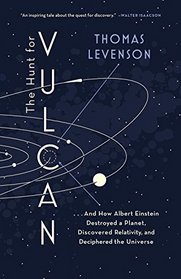Cheryl H. (hoppytoad79) reviewed The Hunt for Vulcan: . . . And How Albert Einstein Destroyed a Planet, Discovered Relativity, and Deciphered the Universe on
An excellent, easily-readable book that is ultimately about the way scientific inquiry and discovery progresses. Scientists are human, prone to ego and biases and 'I-want-to-believe' as much as the rest of us, and the limits technology places on them can limit their study, observation, and exploration. The wonderful thing about science is that it can pursue a wrong direction of inquiry for years, and if that direction proves to be wrong, it is flexible enough to immediately begin pursuing a different direction of inquiry. Levenson, in discussing the search for Vulcan, illustrates both the limits of scientists and all that science and scientific inquiry is capable of. Occasional footnotes clarify any terms that might be unfamiliar to readers, and a biblography in the back provides sources for further reading.




